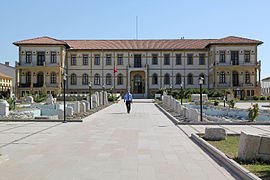|
Çorum
Çorum (Turkish pronunciation: [ˈtʃoɾum]) (Medieval Greek: Ευχάνεια, romanized: Euchaneia) is a northern Anatolian city in Turkey. Çorum is located inland in the central Black Sea Region of Turkey and is approximately 244 km (152 mi) from Ankara and 608 km (378 mi) from Istanbul. It is the seat of Çorum Province and of Çorum District.[2] Its population is 269,595 (2022).[1] The city has an elevation of 801 m (2,628 ft) above sea level. Çorum is primarily known for its Phrygian and Hittite archaeological sites, its thermal springs, and its native roasted chickpea snacks known nationally as leblebi. HistoryThere is ample archaeological evidence for human presence in the area since the Paleolithic Age.[3] The area prospered during the Bronze Age, with the emergence of the Hittite Empire between 1650 and 1200 BCE. Hattusa, the Hittite capital, was located in the region owing to its inherent geographic protection and the well-established local economy as supported by the regional Karum system.[3] There is a hypothesis that the Byzantine town of Euchaneia was at or near the site of the modern city, but others place Euchaneia further east, at Euchaita. In Ancient Greek sources, Çorum was known as Niconia (Nikonya), and in the Byzantine period known as Evkaite.[4]    The settlement of Çorum proper can be traced only to the 16th century. The name is of unknown origin and is first attested in Ottoman records about a Seljuk fortress, Çorum Kalesi, described by Evliya Çelebi.[5] In the mid-16th century, the fortress was divided into four mahalle, or quarters. From 1867 until 1922, Çorum was part of the Angora vilayet. Çorum today   The town today is generally tidy and pleasant, with a locally popular countryside. As with most Central Anatolian and inland Black Sea towns, the population is largely conservative, leading to a generally more restricted nightlife that favors dry establishments, although there are some bars, pubs, and cafés that offer a mix of contemporary and traditional Turkish folk music. Within the city, there is a good range of shops, cafés, and restaurants, with a cuisine that includes a variety of pastries including the nationally known Çorum Mantısı - a popular dish similar to ravioli that is slowly baked in a brick oven or steamed in a beef broth. As well as the archeological and other historic sites, the countryside surrounding Çorum offers many places for picnics, particularly near the Çomar reservoir or in the mountains around the province. The old Ottoman houses, the 19th-century clock tower, and the Çorum Museum, which displays a range of artefacts from excavations in the region, are popular tourist attractions. An International Hittite Congress of archaeologists is held in Çorum every three years. EconomyAlthough the economic output of the city has historically been relatively small, with a focus on traditional crafts such as coppersmithing, tanning, hand weaving, agriculture, and animal husbandry, over the past two decades, the city has shown a significant growth in industrial production and light engineering, making it one of the most industrially advanced cities relative to its population size. Originally home to about 20 tile and brick manufacturing facilities and 10 flour and feed mills, the city today produces a wide variety of products ranging from cement to automobile parts, refined sugar to dairy products, textiles to computer parts, and, more recently, poultry through chicken farming.[6] Population
GeographyÇorum is on the northern edge of the Central Anatolian Plateau. The city is on a plain surrounded by mountains.[7] The Merzifon branch of the North Anatolian Fault passes about 25 km (16 mi) north of Çorum, with the main fault line passing about 60 km (37 mi) north.[8] ClimateÇorum has a warm summer continental climate (Köppen climate classification: Dfb or Trewartha climate classification: Dcb) with dry summers and cold, snowy winters. It also has mild to cool wet springs and autumns with light rain. Highest recorded temperature: 42.6 °C (108.7 °F) on 30 July 2000.
 Twin towns – sister citiesNotable People's Of Çorum
Mayors of Çorum Province
See alsoReferences
External linksWikivoyage has a travel guide for Çorum.
|
||||||||||||||||||||||||||||||||||||||||||||||||||||||||||||||||||||||||||||||||||||||||||||||||||||||||||||||||||||||||||||||||||||||||||||||||||||||||||||||||||||||||||||||||||||||||||||||||||||||||||||||||||||||||||||||||||||||||||||||

